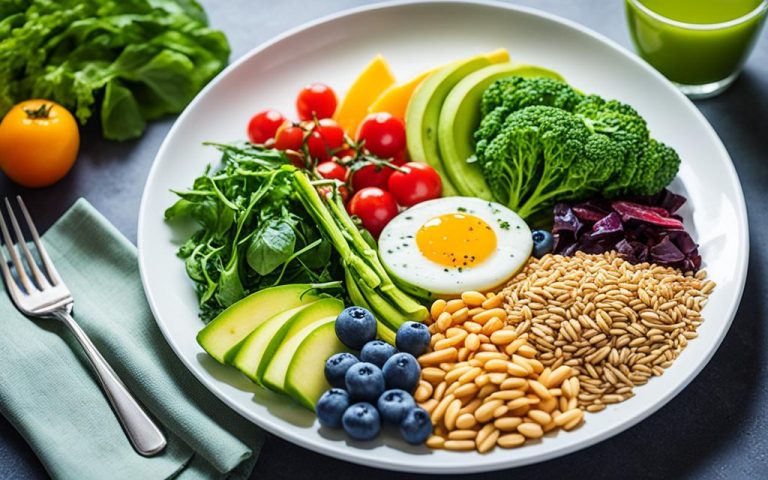Probiotics to Help with Weight Loss: What to Know
Are you searching for a natural way to help with weight loss? Probiotics might be what you need. These tiny microorganisms are crucial for gut health and could help with weight management. As more people seek natural wellness solutions, probiotics are becoming popular for their role in weight loss.
Your gut is filled with trillions of bacteria, both good and bad. Probiotics are the good ones that keep your digestive system healthy. They do more than just help with digestion; they might also help you maintain a healthy weight. By balancing your gut microbiome, probiotics could help your weight management efforts.
Recent studies have found a strong link between gut health and weight control. When your gut bacteria are not in balance, it can affect how your body processes food and stores fat. Probiotics can help restore this balance, making it easier to lose weight and keep it off.
Key Takeaways
- Probiotics support gut health and may aid in weight management
- A balanced gut microbiome is crucial for overall wellness
- Probiotics can influence how your body processes food and stores fat
- Research shows a connection between gut bacteria and weight control
- Adding probiotics to your diet might enhance your weight loss efforts
Understanding the Link Between Probiotics and Weight Loss
Probiotics and weight loss are becoming more connected in health discussions. Your gut microbiome is key to managing your weight and overall health. Let’s look at how these tiny organisms can help you lose weight.
The Role of Gut Microbiome in Weight Management
Your gut microbiome is full of bacteria that affects your health. It changes how your body processes food, stores fat, and controls hunger. A balanced gut microbiome supports healthy digestion and boosts metabolism.
How Probiotics Influence Metabolism
Probiotics boost your metabolism naturally. They make food easier to break down. This means your body gets more nutrients and energy. This can help with weight management and increase energy.
Balancing Gut Bacteria for Optimal Health
Having a diverse and balanced gut microbiome is crucial for good health. Probiotics add beneficial bacteria to your gut. This balance helps control weight, lowers inflammation, and boosts overall health.
- Supports healthy digestion
- Enhances nutrient absorption
- Helps regulate appetite
- May reduce fat storage
Adding probiotics to your diet is a step towards better gut health and weight loss. Remember, probiotics work best with a balanced diet and healthy lifestyle.
The Science Behind Probiotics and Weight Management
Studies have found a link between probiotics and weight management. Some probiotic strains can help you lose weight, reduce fat, and shrink your waist. These good bacteria help you reach your weight loss goals in different ways.
Probiotics boost fat burning by making proteins that control fat metabolism. They also keep blood sugar levels in check, which can stop cravings and help you eat less. Some types even stop your body from absorbing dietary fat, leading to more fat being excreted.
Probiotics also support your immune system. They make the gut barrier stronger, keeping bad bacteria out of your bloodstream. This lowers inflammation, which is often connected to being overweight.
| Probiotic Strain | Weight Loss Benefit | Immune Support |
|---|---|---|
| Lactobacillus gasseri | Reduces belly fat | Enhances natural killer cell activity |
| Bifidobacterium lactis | Improves metabolism | Boosts antibody production |
| Lactobacillus rhamnosus | Supports appetite control | Regulates inflammatory responses |
Remember, probiotics are best used with a healthy diet and regular exercise. Adding probiotic-rich foods or supplements to your routine can help with weight management and overall health.
Key Probiotic Strains for Weight Loss Support
Probiotics are key for managing weight and keeping the gut healthy. Certain strains have shown they can help with weight loss. Let’s look at some important probiotic strains for a healthier weight.
Lactobacillus Strains and Their Benefits
Lactobacillus strains are great for weight management. They break down food, absorb nutrients, and help regulate metabolism. Some top Lactobacillus strains include:
- L. gasseri: Reduces belly fat and waist size
- L. rhamnosus: Supports weight loss in women
- L. plantarum: Helps reduce body fat percentage
Bifidobacterium: A Powerful Ally in Weight Control
Bifidobacterium strains are vital for a healthy gut. They help with digestion and control inflammation, which affects weight. Key Bifidobacterium strains include:
- B. lactis: Improves metabolic health
- B. breve: Reduces body fat and supports metabolism
Other Beneficial Probiotic Strains for Weight Loss
Other probiotic strains also help with weight loss:
| Strain | Benefit |
|---|---|
| Streptococcus thermophilus | Enhances digestion and nutrient absorption |
| Bacillus coagulans | Reduces body fat and improves lean body mass |
| Saccharomyces boulardii | Supports gut health and may aid weight management |
Adding these probiotic strains to your diet through food or supplements can help your gut health and weight loss. Always talk to a healthcare professional before starting any new supplements.
How Probiotics Enhance Digestion and Nutrient Absorption
Probiotics are key for healthy digestion and better nutrient absorption. They help your gut health. This is important for a balanced metabolism and reaching weight loss goals.

Improving Gut Motility and Regularity
Probiotics make your digestive system work better. They boost gut motility, which is how food moves through your body. This helps with regular bowel movements and stops constipation, which can slow down weight loss.
- Reduces bloating and discomfort
- Promotes regular bowel movements
- Supports overall gut health
Enhancing Nutrient Uptake for Better Metabolism
Probiotics help your body get more nutrients from food. They break down tough molecules. This makes it easier for your body to use important vitamins and minerals.
| Nutrient | Role in Metabolism | Probiotic Impact |
|---|---|---|
| B Vitamins | Energy production | Increased absorption |
| Iron | Oxygen transport | Enhanced uptake |
| Calcium | Bone health | Improved absorption |
Adding probiotics to your diet helps with healthy digestion and better nutrient absorption. This can improve your metabolism and help with weight loss.
Combining Probiotics with a Healthy Diet for Optimal Results
Pairing probiotics with a healthy diet is a great way to manage weight. This combo boosts gut health and helps with weight loss. Let’s look at how to make a probiotic-rich diet that fits your lifestyle.
Begin by adding probiotic-rich foods to your meals. Yogurt, kefir, and fermented veggies like kimchi or sauerkraut are great picks. These foods feed the good bacteria in your gut, helping with digestion and nutrient uptake.
Dietary fiber is key for a probiotic-friendly diet. It feeds the good bacteria in your gut. Try to eat a mix of fiber-rich foods:
- Whole grains (oats, quinoa, brown rice)
- Legumes (beans, lentils, chickpeas)
- Fruits (apples, berries, pears)
- Vegetables (broccoli, carrots, Brussels sprouts)
Balance your meals with lean proteins and healthy fats for better nutrition and fullness. This helps you stay satisfied and eat less.
| Meal | Probiotic Source | Fiber Source | Protein/Fat Source |
|---|---|---|---|
| Breakfast | Greek yogurt | Oatmeal with berries | Almonds |
| Lunch | Kefir smoothie | Mixed green salad | Grilled chicken breast |
| Dinner | Kimchi | Brown rice and broccoli | Baked salmon |
Don’t forget to drink plenty of water and eat fewer processed foods. These steps, along with probiotics, can greatly improve your weight management and health.
Probiotic-Rich Foods vs. Supplements: Which is Better for Weight Loss?
Improving gut health and losing weight can be done with probiotic-rich foods and supplements. Let’s look at the best choices for you.
Natural Sources of Probiotics in Your Diet
Eating probiotic-rich foods is a tasty way to help your gut. These foods have live bacteria that are good for your digestive system and health.
- Yogurt
- Kefir
- Sauerkraut
- Kimchi
- Kombucha
These foods give you probiotics and other nutrients. They also have dietary fiber, which helps with weight management.
Choosing the Right Probiotic Supplement
Probiotic supplements give you a lot of beneficial bacteria. When picking a supplement, look for:
- Multiple strains of bacteria
- A high colony-forming unit (CFU) count
- Proper storage to keep potency
- Reputable manufacturers
Balancing Food Sources and Supplements
Using both probiotic-rich foods and supplements is often the best plan. This mix gives you a variety of good bacteria. It also helps your gut health.
| Probiotic Source | Advantages | Considerations |
|---|---|---|
| Foods | Natural, additional nutrients, dietary fiber | Variable probiotic content, may require daily consumption |
| Supplements | Concentrated dose, specific strains | May lack additional nutrients, can be costly |
Using both probiotic-rich foods and supplements together can help your gut health and weight loss goals the most.
The Connection Between Probiotics, Inflammation, and Weight Loss
Probiotics are key in fighting inflammation and helping with weight control. They live in the gut with trillions of bacteria, affecting how your body reacts to inflammation. If this balance gets off, it can cause chronic inflammation and weight gain.
Probiotics act as natural fighters against inflammation. They cut down on harmful gut bacteria that can cause inflammation. By keeping the gut healthy, probiotics help you stay at a healthy weight.
“A balanced gut microbiome is key to reducing inflammation and supporting weight loss efforts.”
Studies show that some probiotics can lower inflammation markers in the body. This can make metabolism better and make it easier to manage weight.
| Probiotic Strain | Anti-inflammatory Effect | Potential Weight Loss Benefit |
|---|---|---|
| Lactobacillus gasseri | Reduces belly fat | Decreases body weight and waist size |
| Bifidobacterium breve | Lowers inflammatory markers | Improves body composition |
| Lactobacillus rhamnosus | Balances gut bacteria | Supports long-term weight management |
Adding probiotics to your diet can help keep your gut healthy, lower inflammation, and aid in weight loss. Remember, being consistent with probiotics is important for health benefits.
Potential Side Effects and Considerations When Using Probiotics
Probiotics are great for gut health and immune support. But, it’s important to know about their side effects and who should be careful with them.
Common Side Effects of Probiotic Supplementation
Some folks might feel a bit off when they start taking probiotics. These feelings usually go away as your body gets used to them:
- Bloating
- Gas
- Mild abdominal cramps
- Temporary changes in bowel movements
Who Should Avoid Probiotic Supplements?
Some people should be extra careful or avoid probiotics:
| Group | Recommendation |
|---|---|
| Immunocompromised individuals | Consult doctor before use |
| People with severe allergies | Check supplement ingredients carefully |
| Those with chronic illnesses | Seek medical advice first |
| Pregnant or breastfeeding women | Discuss with healthcare provider |
Consulting with Healthcare Professionals
Before starting probiotics, talk to your doctor. They can tell you if they’re good for you and help pick the right kind for your gut health goals.
Remember, probiotics help with wellness but aren’t a replacement for a good diet and lifestyle. Always focus on your gut health and immune support with a balanced approach to eating and living well.
Integrating Probiotics into Your Weight Loss Journey: Tips and Tricks
Ready to boost your weight management efforts? Adding probiotics to your routine can be a game-changer. Start by taking your probiotic supplement with breakfast to kickstart healthy digestion for the day. This timing helps your body make the most of these beneficial bacteria.
Pair your probiotics with fiber-rich foods to create a powerhouse for your gut health. Think whole grains, fruits, and vegetables. This combo supports metabolism boosters and helps you feel fuller longer, aiding in portion control.
Don’t forget to stay hydrated! Water is crucial for healthy digestion and can amplify the effects of probiotics. Aim for at least eight glasses a day. Remember, probiotics work best as part of a balanced approach. Include regular exercise and stress management in your weight loss plan for optimal results.
Consistency is key when it comes to probiotics and weight management. Make them a daily habit, just like brushing your teeth. Over time, you’ll likely notice improvements in your digestion, energy levels, and potentially, the number on the scale. Keep at it, and let those friendly bacteria work their magic!
FAQ
What are probiotics, and how do they relate to weight loss?
Probiotics are live bacteria and yeasts that are good for your health, especially your digestive system. They might help with weight management by affecting metabolism, reducing inflammation, and improving how your body absorbs nutrients.
How do probiotics influence gut health and weight management?
Probiotics keep the balance of good bacteria in your gut, known as the gut microbiome. A healthy gut microbiome can help with metabolism, digestion, and nutrient absorption. This can support weight management.
Are there specific probiotic strains that are more effective for weight loss?
Yes, some probiotic strains are more effective for weight loss. These include Lactobacillus gasseri, Lactobacillus rhamnosus, Bifidobacterium breve, and Bifidobacterium lactis.
Can probiotics help boost metabolism?
Yes, probiotics might help boost metabolism. They can improve nutrient absorption, regulate appetite hormones, and reduce inflammation. This can help with weight management.
How do probiotics improve digestion and nutrient absorption?
Probiotics can make digestion smoother and more regular. They help with nutrient uptake. They also produce enzymes that break down food better, leading to better nutrient absorption.
Should I consume probiotic-rich foods or take a supplement for weight loss?
Both probiotic-rich foods (like yogurt, kefir, and fermented veggies) and supplements can help with weight loss. It’s best to use both for the best results.
Are there any potential side effects of taking probiotic supplements?
Most people don’t have problems with probiotics, but some might feel gas, bloating, or discomfort when starting them. Always talk to a healthcare professional, especially if you have health issues.
Can probiotics alone lead to substantial weight loss?
Probiotics can help with weight management, but they’re not a quick fix for losing a lot of weight. For the best results, combine them with a healthy diet, exercise, and a good lifestyle.
How long does it take to see the benefits of probiotics for weight loss?
Seeing the benefits of probiotics can vary. Some people might notice better digestion and health in a few weeks. Others might need several months of taking probiotics to see weight changes.







